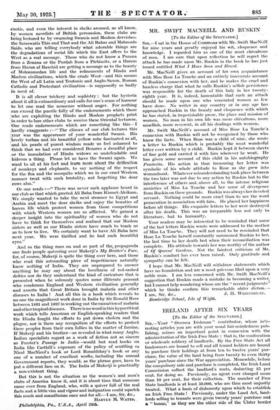- MR. SWIFT MACNEILL AND RUSKIN
[To the Editor of the SPECTATOR.]
Sta,—I sat in the House of Commons with Mr. Swift MacNeill for nine years and greatly enjoyed his wit, eloquence and knowledge. I regarded him as one of the most chivalrous of men. I am sure that upon reflection he will regret the attack he has made upon Mr. Ruskin in the book he has just issued entitled What I Have Seen and Heard.
Mr. MacNeill gives an account of his own acquaintance with Miss Rose La Touche and an entirely inaccurate account of Ruskin's connexion with her, and he makes the cruel and baseless charge that what he calls Ruskin's selfish persistence was responsible for the death of this lady in her twenty- eighth year. It is, indeed, lamentable that such an attack should be made upon one who venerated women as few have done. No writer in any country or in any age has approached Ruskin in the beauty and eloquence with which he has stated, in imperishable prose, the place and mission of women. No man in his own life was more chivalrous, more unselfish, more reverent, in all his dealings with women.
Mr. Swift MacNeill's account of Miss Rose La Touche's connexion with Ruskin will not be recognized by those who know the facts. When Rose was a child of nine, she wrote a letter to Ruskin which is probably the most wonderful letter ever written by a child. Ruskin kept it between sheets of fine gold and carried it with him wherever he went. He has given some account of this child in his autobiography Praeterita. His action in thus treasuring her letter was symbolic of his whole attitude to Rose as she grew into womanhood. Whatever misunderstanding took place between the two later was not due to any action by Ruskin but to the interference of others and, above all, to the intense religious anxieties of Miss La Touche and her sense of divergence from Ruskin on these grounds. Ruskin was always her devoted servant. Nothing could be more cruel than to use the word persecution in association with him. He placed her happiness before all things. His exquisite letters to her were destroyed after his death. This was an irreparable loss not only to literature, but to humanity.
Your readers may be interested to be reminded that some of the last letters Ruskin wrote were addressed to the mother of Miss La Touche. They will not need to be reminded that Rose La Touche herself constantly summoned Ruskin to her, the last time to her death bed when their reconciliation was complete. His attitude towards her was worthy of the author of Of Queens' Gardens. Not the faintest criticism of Mr. Ruskin's conduct has ever been raised. Only gratitude and sympathy can be felt.
I hope that Mr. MacNeill will withdraw statements which have no foundation and are a most grievous libel upon a very noble man. I am less concerned with Mr. Swift MacNeill's suggestion that Ruskin made a mistake in becoming a writer, but I cannot help wondering whose are the " recent judgments" which he thinks confirm this remarkable °biter dictum.— I am, Sir, &c., J. II. WHITEHOUSE. Bembridge School, Isle of Wight.










































 Previous page
Previous page